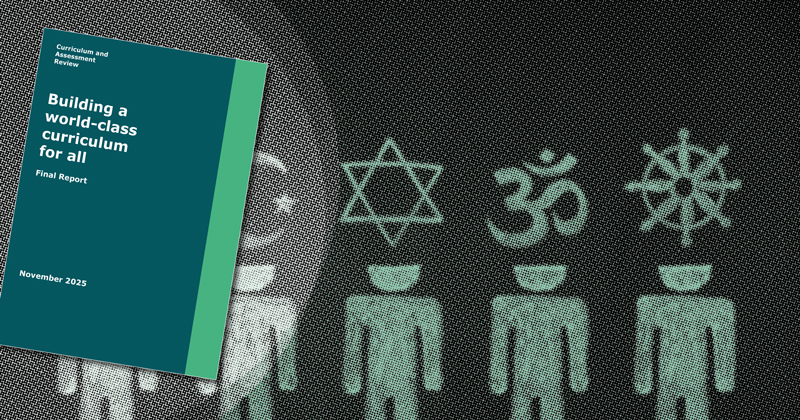Since the 1988 Education Reform Act, religious education (RE) has been a compulsory subject in schools, but not part of the national curriculum. Each local authority provides its own agreed syllabus, determining what is taught.
Ask any RE teacher and they’ll tell you that as well-meaning as this system is, it’s not working. Many schools are not following their statutory obligations to deliver the subject across all the key stages.
The hundreds of different syllabuses across the country vary significantly.
“Superficially broad” and lacking “sufficient substance to prepare pupils to live in a complex world” was the verdict from last year’s Ofsted subject report.
But all this will now change.
‘RE has started to diminish’
From 2028, RE is set to become part of the national curriculum. The RE community largely agrees this is the right step, echoing the review’s belief that it will “improve access to high-quality provision and prevent further diminishment”.
And RE has sadly started to diminish. The stark reality is that although uptake at GCSE level remains stable, a worrying number of young people are leaving school having received poor religious education that can embed misconceptions.
Neither the present curriculum nor local authorities alone are solely at fault. The subject has faced neglect in recent years.
Around half of teachers who deliver RE lessons in secondary schools spend most of their time teaching another subject.
But more people, from politicians and business leaders to parents and young people themselves, are championing the importance of religious education in modern Britain.
Previous research has claimed to show the subject is losing its relevance as the nation secularises. But when the public is polled on the teaching and learning that comes with modern, high-quality RE lessons, the support soars.
‘Allowing every young person to benefit’
Inclusion in the national curriculum, we hope, alongside more robust accountability measures, will allow every young person to benefit from high-quality RE wherever they live.
The government has said this will all hinge on the sector reaching a consensus about how to introduce this policy. But it creates an exciting opportunity for the sector to create an agreed framework to make it happen.
Religious and community leaders can join experienced teachers to develop the building blocks of a curriculum that allows young people to grasp both the historical context of religions and beliefs, and their lived expressions in modern Britain.
Though of course there will be some disagreement, when it comes to watching an RE lesson we increasingly agree what “high quality” looks like.
We know that good RE enables young people to not only explore their own beliefs but also those of others with academic rigour and respect. As Ofsted has stated in its observations: “At its best, it is intellectually challenging and personally enriching, while also allowing pupils the opportunity to make sense of their own place in the world.”
The Religious Education Council has already laid important groundwork. Our National Content Standard is highlighted in the curriculum and assessment review as a “catalyst for change”. It’s built on extensive collaboration across the sector to define what “quality” means in the classroom.
‘Be excited about the subject’
Rather than prescribing content, we also provide criteria for its selection – allowing schools to reflect their religious character and community while also ensuring academic depth.
A lesson at key stage 4, for instance, might explore the difference between institutional and individual religious and non-religious worldviews by exploring ethical issues around the sanctity of life.
At key stage 5, it might examine the influence of religious and non-religious traditions on attitudes to the environment, technological change and justice and equality.
Students, rather than being passive learners, are actively engaged in an academic inquiry devoted to understanding the different beliefs found in modern Britain in relation to life’s big questions.
What should schools do next? Above all, we encourage you to be excited about a subject that will intellectually stimulate your students and build stronger, more understanding relationships among their peers, their community and the world beyond.








Your thoughts